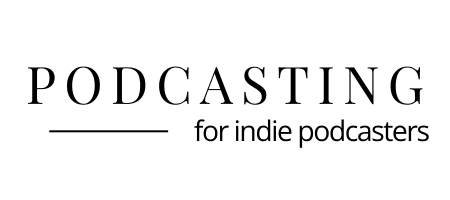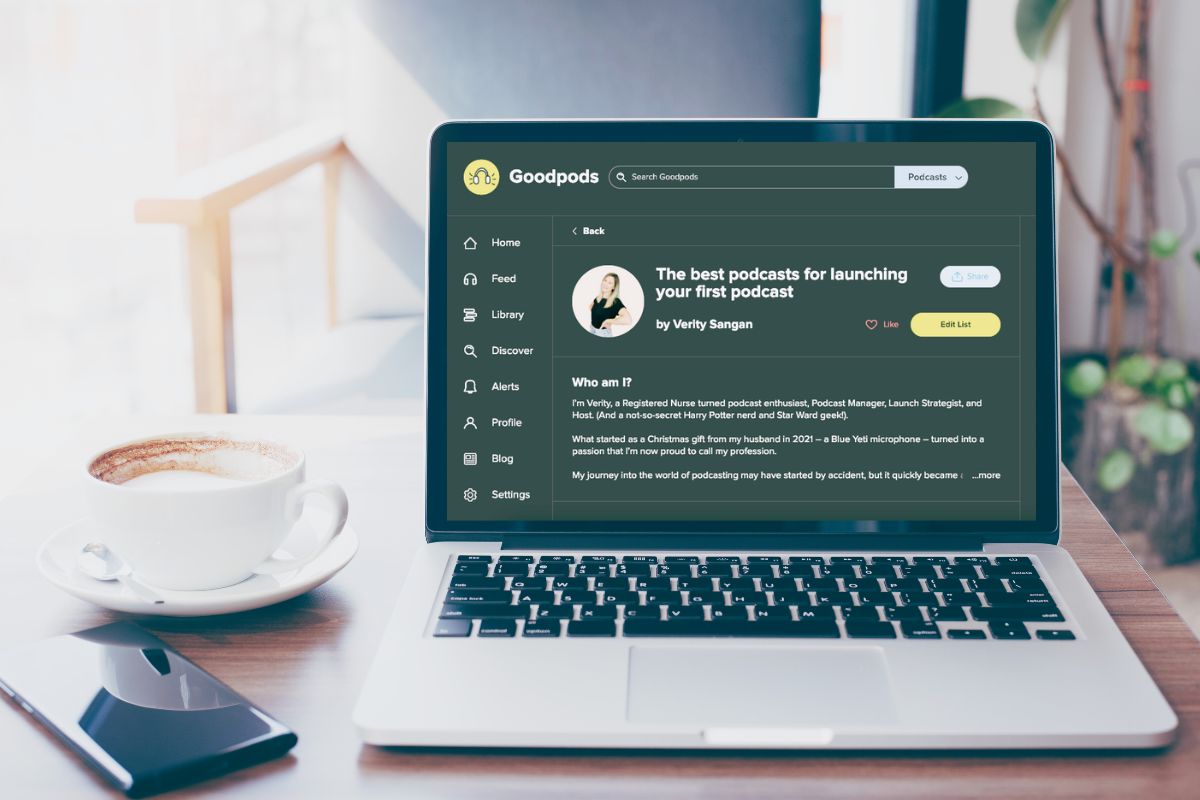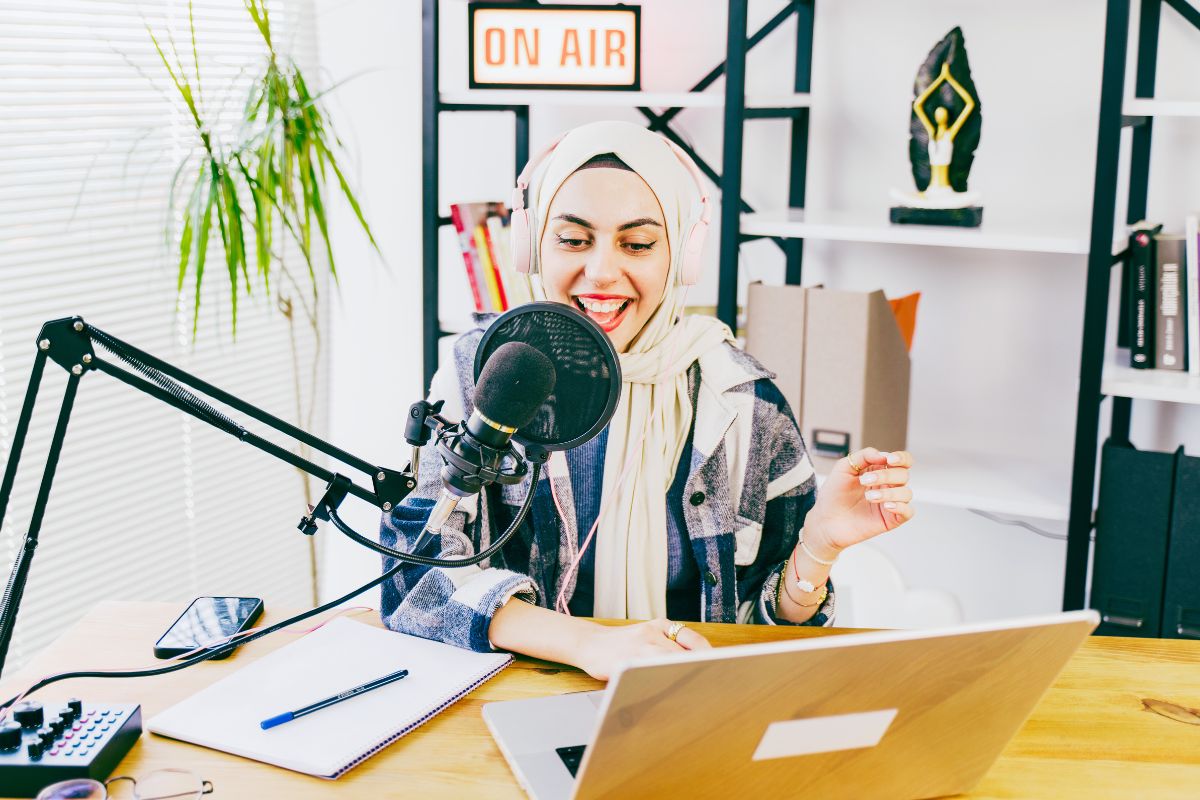
10 Ways to Monetise Your Podcast for Free
Like a lot of podcasters, you’ve probably thought a some point or another about ways to monetise your podcast. And bonus points if you can monetise your podcast in a way that costs you no money as well.
However, knowing how to monetise your podcast can be tricky.
There are a lot of options and avenues that you could go down. And what works to monetise your podcast, might not work so well for someone else. So, in this post, I’m giving you 10 ways to monetise your podcast FOR FREE. All that each of these things will cost you is some time and effort, making them relatively easy to set up.
Can you monetise a podcast?
Before we look at HOW to monetise your podcast, we need to understand that you CAN monetise your podcast.
Because you can.
And it doesn’t have to include what your best podcasting mate is doing, either.
Podcasters monetise their content in a whole variety of different ways. So, in short, yes YOU CAN monetise your podcast if this feels right for you. You can monetise in 1 way or 20 ways. It’s whatever works for your show, content, and your aims and objectives for monetising. But on that note, let’s first review what you should have in place BEFORE you start monetising your podcast.
How many listeners do you need to monetise a podcast?
Well, the good news is that you don’t need many.
The bad news is that you do need some.
And the annoying news is that there isn’t an exact number to answer this question with.
You see, you need listeners to monetise your podcast; otherwise, you’ve got no one to monetise from. However, you don’t necessarily need a huge audience. If, for example, you have a small but highly engaged audience, monetising might be more straightforward and easier than having a huge audience who aren’t as interested in parting with their cash.
Equally, you need to be monetising in a way that resonates with your podcast’s audience and aligns with their values.
On saying all of that, a lot of sponsorships tend to get based on per 1,000 downloads (I said ‘tent to,’ not ‘all’), so be prepared to answer questions about your download numbers when you reach out to potential sponsors. But equally, I’ve landed partnerships based on my show’s concept before it had even started. So there isn’t a hard and fast rule here either.
How much money can I make by monetising my podcast?
How long is a piece of string?
Honestly? I can’t give you a solid answer to this one either. This is because there are SO many factors that will go into your earning potential. These might include:
- Your audience
- Your monetisation options
- Your monetisation strategy
- Social media strategy
- The efforts you put in
- Your time dedication
- The alignment of the moon and the planets…
Ok, maybe not the last one. But, you get my point that there can be so many things that can and will impact on your earning potential when it comes to monetising your podcast.
That’s why I’d suggest strategising your monetisation carefully and create personalised goals and action points to help you see the monetary success that you want.
What if I try to monetise and it doesn’t work?
Good question.
Remember that there are a load of things that can impact monetisation strategies. Before you give up or randomly jump onto another idea, consider what went wrong and why. Was it your approach? Your messaging? Were your audience not prepared for your monetisation options? Was what you were doing aligned with your audience and your podcast? Did you give your monetisation option enough time to gain traction and start to work? Have you given up because you didn’t see overnight results?
Next, decide if you’re going to try something else, or try tweaking your current plan. Sometimes we’re further ahead of a plan than we first thought and we just needed to tweak what we were doing a little bit or carry on what we were doing for a little bit longer to see success.
What you need to have in place BEFORE you monetise your podcast
Before diving into the different ways to monetise your podcast, it’s essential to have a few key elements in place.
1. Know your target audience
First and foremost, you need to have a clear understanding of your target audience. Knowing who your listeners are and what they want will help you tailor your monetisation strategies to their needs. For example, there’s little point in trying to sell t-shirts to an audience who wants to give you their money for early-access content. Or giving early-access content to an audience who want coaching from you.
So to start off with, figure out who your audience is and what they want/need.
You can find out this information in a variety of ways including engaging with your audience on social media, polls, questionnaires, asking for feedback…
The possibilities of finding out what your audience wants and needs are endless, so try a few out to get the info that you need.
2. Have quality content
In addition to understanding your audience, you should also have a consistent and high-quality podcast.
This might sound basic, but, your audience will only want to buy from you if you’re giving them good-quality content in the first place.
Producing quality and engaging content that keeps listeners coming back is crucial for building a loyal audience and attracting potential sponsors or advertisers.
And by quality, I don’t mean that you have to run out and buy a $1,000 microphone. I mean that the content that you’re producing serves some sort of value or need for your audience. For example, your content might educate, it might entertain, it might provide information.
Whatever it is, there needs to be an element of value because then your audience will want to invest further with you.
3. Check out your online presence
Finally, it’s essential to have a strong online presence.
Your online presence might look different to another podcaster’s. After all, how, when, and where you show up online needs to work for you and your podcast.
However, having an online presence and content strategy to go with it will help raise your profile and give your audience ways to invest in your monetisation options.
Ways of building your online presence may include:
- Creating a website
- A landing page for your podcast
- Building an email list
- Social media i.e. Facebook, Twitter, Threads, Instagram, LinkedIn
- Online forums i.e. Reddit
- Podcasting apps such as GoodPods
Remember, choose the ways of building an online presence that work for you and your podcast. There’s no need to burn yourself out by trying to be everywhere and do everything.
I’m a firm believer that it’s better to do a couple of things really well than loads at a mediocre level of input.
10 free ways to monetise your podcast
Now that we’ve got that out of the way, let’s dive into the 10 ways that you can monetise your podcast for free:
Sponsorship opportunities
One of the most common ways to monetise your podcast is through sponsorships.
Sponsorships work with advertisers paying you to have their product or service promoted during your show. This is typically in pre- or mid-roll ads. You can reach out to potential sponsors or use a platform like Podcorn to connect with brands looking to advertise on podcasts.
When partnering with brands, I always like to consider a few things first:
- Do I like/use this product?
- Is this product relevant to my audience?
Sponsorship opportunities won’t cost you a penny but will cost you in your time and effort.
Whether you cold-pitch to brands directly or use platforms such as Podcorn, there is still time needed to search through opportunities and put together a good pitch to the company as to why they should work for you.
And I’d never advocate a copy-and-paste approach to your pitches.
Yes, there will be some information that copies across (such as stats, etc.), but you want the person who reads the pitch to feel like you’re writing to them and that you value their brand. Not that you want to partner with just anybody.
Affiliate marketing
Another way to monetise your podcast is through affiliate marketing. Affiliate marketing involves promoting products or services to your listeners and earning a commission on any sales that result from your recommendation.
It’s a well-known monetisation method in the blogging world and is just as easily replicated in podcasting as well.
Like sponsored advertising, the investment from you comes with finding the affiliate programmes that you want to represent, applying for them, and then creating the content to promote the products and services from these brands.
Side note: When using affiliate links, remember to include relevant statements about your inclusion of affiliate links at the top of your blog posts (like the one at the top of this post) and in your Privacy Policy.
Merchandise sales
If you have a loyal fan base, consider selling merchandise like t-shirts, mugs, or stickers featuring your podcast logo or catchphrase.
You can set up an online store on platforms like Shopify or Teespring to handle the production and shipping of your merchandise.
Merchandise sales is something that I have just started in August of 2023. I’ve no idea how it’s going to go and I’ll be sure to report back on it soon to you.
But, I started off creating merchandise with nothing more than my Canva account, Printful, and the WooCommerce plugin. Granted, I do pay for Canva Pro, but the free version of Canva will work just as well for you for this.
From my point of view, so far my only investment has been the time to design the products and set up the backend of the store.
Premium content
Premium content is where you offer exclusive content to your most dedicated fans through a paid subscription or membership programme. This could include bonus episodes, behind-the-scenes content, or access to a private community.
Patreon is probably the best-known platform for premium content, but there are also platforms such as Buy Me a Coffee and Ko-Fi.
Whilst platforms such as Patreon will take a cut of your earnings, premium content platforms are free to initially set up.
Tipping
Depending on your model, you could set up one of these platforms to have fans tip you as a one-off, or monthly until cancelled purely to support your show. You don’t always have to give extra content in return. Some fans will happily give you a few pounds a month just because they like your content!
Buy Me a Coffee and Ko-Fi are well set up for tipping (have you noticed the little ‘Tip Me’ icon in the corner? That’s created through Ko-Fi!).
Like premium content platforms, whilst some might take a cut of your earnings, others will let you keep 100% of your earnings. Some, like Ko-Fi will only take a percentage of your earnings if you agree to it, but they’ll give you extra features on their platform in return for this.
Live events
Ok, live events might sound like an expensive way to monetise your podcast, but I’m not suggesting that you suddenly try to book and fill the whole of Wembley Stadium.
Consider hosting live events like Q&A sessions, or live podcast recordings. These don’t even need to be held in a special venue. You could do it all online and either sell tickets for a fixed price for people to attend or set up a ‘pay-your-own-price’ checkout. That way, attendees can donate what they would like, or can afford, with very little effort from you.
Consulting or coaching services
If you’re an expert in your field, offering consulting or coaching services to your listeners can be very lucrative.
You can promote these services during your podcast and charge a fee for your time.
Consulting or coaching might not be for everyone. After all, if you have a full-time, or even part-time job, fitting in these services might be a little tight. But, offering consulting or coaching doesn’t require an initial investment from you before you start.
Public speaking
You already talk on your podcast, so why not do public speaking as well? You could use your podcast as a platform to showcase your expertise and attract speaking opportunities. Put a page on your website and post on social media so that people know that you’re open to public speaking opportunities.
Charge a fee for your speaking engagements or use them to promote your consulting services.
Brand partnerships
Brand partnerships are all about working with brands to create sponsored content or collaborate on projects that align with your podcast’s niche. This can include sponsored episodes, social media campaigns, or product reviews.
Brand partnerships can be easier to land than a lot of people realise. A lot of it comes down to networking, being open to conversation, and keeping good relationships with people.
This isn’t always easy for a self-confessed introvert. But, I’ve landed some amazing brand partnerships through the power of networking and coffee chats. Again, the investment from you is your time to meet people, create genuine relationships with key people from the brands you want to work with and also the time to create the content that will meet the requirements of the partnership.
Advertising networks
Joining an advertising network like can help you connect with advertisers looking to promote their products or services on podcasts. These networks handle the ad sales process and typically pay podcasters based on the number of impressions or downloads their show receives.
Some advertising networks will take on any show, regardless of listenership or download stats. Others will only work with podcasts that reach certain stats per episode or per month. Advertising networks will often also take a cut of the money paid to you from sales made from the ads in your podcast, so be sure to read contracts and agreements carefully before signing them.
Again, your time is all that’s needed to work with an advertising network. Time is needed to research different networks and, once you’ve found one you want to work with, time to be signed up with that network.
Conclusion
There are many ways to monetise your podcast for free. No two podcasts will monetise in the same way, so experiment with different strategies to find the ones that work best for your audience and niche.
Remember that it’s okay to combine different types of monetisation methods. Also, remember that building a successful podcast takes time and effort, so stay committed to producing high-quality content that your listeners will love.
My final note on monetising your podcast is to do it legally. Be aware of how to declare any income you make for tax purposes and remember to get proper advice if you’re looking to set up a business as part of your monetising venture.






